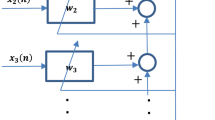Abstract
Blind signal processing (BSS) is a fairly new and generally applicable technique. A very intuitive and important principle for the BSS problem is to maximize/minimize non-Gaussianity. Gaussian moments are introduced here as a quantitative measure of non-Gaussianity for a random variable. A proper contrast function is presented correspondingly that has not asymptotic bias even in the noisy context. After maximization of the contrast function, an improved BSS algorithm is introduced correspondingly. Computer simulations demonstrate the efficiency of the proposed approach.
Access this chapter
Tax calculation will be finalised at checkout
Purchases are for personal use only
Similar content being viewed by others
References
Cichocki, A., Amari, S.: Adaptive Blind Signal and Image Processing. Wiley, New York (2003)
Barros, A.K., Cichocki, A.: Extraction of specific signals with temporal structure. Neural Comput. 13(9), 1995–2003 (2001)
Hyvärinen, A., Karhunen, J., Oja, E.: Independent Component Analysis. Wiley, New York (2001)
Hyvärinen, A.: A unifying model for blind separation of independent sources. Signal Process. 85, 1419–1427 (2005)
Zhao, Y.J., Liu, B.Q., Wang, S.: A robust extraction algorithm for biomedical signals from noisy mixtures. Front. Comput. Sci. China 5(4), 387–394 (2011)
Leong, W.Y., Mandic, D.P.: Noisy component extraction (NoiCE). IEEE Trans. Circuits Syst. 57(3), 664–671 (2010)
Lu, W., Rajapakse, J.C.: ICA with reference. Neurocomputing 69(16–18), 2244–2257 (2006)
James, C.J., Hesse, C.W.: Independent component analysis for biomedical signals. Physiol. Meas. 26(1), 15–39 (2005)
Liu, W., Mandic, D.P.: A normalized kurtosis-based algorithm for blind source extraction from noisy measurements. Signal Process. 86(7), 1580–1585 (2006)
Yu, D., Peng, L.: When does inferring reputation probability countervail temptation in cooperative behaviors for the prisoners’ dilemma game? Chaos Solitons Fractals 78, 238–244 (2015)
Acknowledgement
This paper is partially supported by Shandong Provincial Natural Science Foundation, China (ZR2017MA046) and the National Science Foundation of China (11473019). The authors gratefully acknowledge the helpful comments and suggestions of the reviewers, which have improved the presentation.
Author information
Authors and Affiliations
Corresponding author
Editor information
Editors and Affiliations
Rights and permissions
Copyright information
© 2019 Springer Nature Switzerland AG
About this paper
Cite this paper
Zhao, Y. (2019). Component Separation with Gaussian Moments. In: Abawajy, J., Choo, KK., Islam, R., Xu, Z., Atiquzzaman, M. (eds) International Conference on Applications and Techniques in Cyber Security and Intelligence ATCI 2018. ATCI 2018. Advances in Intelligent Systems and Computing, vol 842. Springer, Cham. https://doi.org/10.1007/978-3-319-98776-7_166
Download citation
DOI: https://doi.org/10.1007/978-3-319-98776-7_166
Published:
Publisher Name: Springer, Cham
Print ISBN: 978-3-319-98775-0
Online ISBN: 978-3-319-98776-7
eBook Packages: Intelligent Technologies and RoboticsIntelligent Technologies and Robotics (R0)




